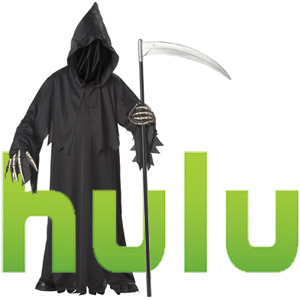 NEWS
NEWS
 NEWS
NEWS
 NEWS
NEWS
![]() Dark rumors and accusations seem to be telling a compelling narrative about Hulu—the broadly popular venue for free Internet TV (supported by advertisements)—potentially backing away from offering their media without strings to the pubic and instead requiring cable or satellite authentication.
Dark rumors and accusations seem to be telling a compelling narrative about Hulu—the broadly popular venue for free Internet TV (supported by advertisements)—potentially backing away from offering their media without strings to the pubic and instead requiring cable or satellite authentication.
The New York Post reports that sources told them that this might be the intent of Hulu and it leads an explanation as to why Providence Equity Partners has left the Internet TV outfit after almost five years and $200 million of support. According to the numbers, Hulu has attracted in excess of 31 million unique users in March, all under their free-for-all model; but that is potentially soon to dwindle.
Under the new model, users will log into Hulu using authentication numbers received from their local cable or satellite TV network—meaning, from the outset, that if you don’t happen to have a customer number for cable or satellite TV then you’re out of luck.
What this will do to Hulu-centric shows such as Endgame or The Booth at the End is anyone’s guess. Being part of a free-to-watch model means that advertisers and producers have an audience they otherwise couldn’t reach via conventional distribution networks.
Hulu, owned by News Corp., Disney, Comcast and Providence, could see its March audience, as measured by ComScore, shrink after authentication. Hulu racked up some $420 million in ad revenue last year and is expected to do well in this year’s ad negotiations.
But the move toward authentication, which could take years to complete, will make cable companies happy because it could slow cord-cutting by making cable subscribing more attractive.
At the same time, networks are asking cable companies for retransmission money, a process that could be more appetizing for Comcast and its rivals if their subscriber base stopped shrinking.
We’ve spoken about cord-cutting as a phenomenon before on SiliconANGLE and it’s a potential fear of many cable outfits, which is why Editor in Chief Mark Hopkins believes this move has Comcast’s fingerprints all over it.
“This will end Hulu,” Hopkins says. “This has the fingerprint of Comcast (NBC’s new owner) all over it.”
Subscription-based services receive both a monthly fee from users and they display commercials (often more commercials than venues like Hulu) but are cumbersome and expensive. As a result, they’ve been eschewed by much of the Internet TV subscriber base for cheaper options—after all, why pay for cable or satellite when the Internet is already something we pay for.
Even Hulu sought to may extra money by offering Hulu+ in order to compete with Amazon Prime’s streaming, Netflix, and even YouTube. Although insofar Hulu has been the best option for organized, good content without a subscription—Netflix and Amazon Prime both have a subscription, and licensing wars with HBO, Starz, and media networks continue to rip holes in their capability to provide content.
We’ve seen set-to-boxes begin to edge into the marketplace because they offer the capability of bringing Internet TV into the home via extra subscriptions atop fees to an ISP. We’ve also seen Xbox LIVE narrowing in as entertainment-center for media produced via various outfits (but for a cable-like subscription.)
If this is a cynical move by Comcast to tighten their grip over Hulu and push out competition by making sure that viewers have no place to go, it will change the Internet TV landscape. As a free-TV offering, Hulu has made an amazing run. We’ve seen statistics that say that advertisers who show ads on their network get a higher eyeball return (or at least people watch them more often instead of ducking out for the commercial break) and the number of visitors to watch streaming shows means that the producers of these features get a lot of attention themselves.
Cable may be shaking in their boots at this prospect; but perhaps they should be embracing it instead and convince their networks to license more work to distributors like Hulu rather than trying to choke them out.
THANK YOU